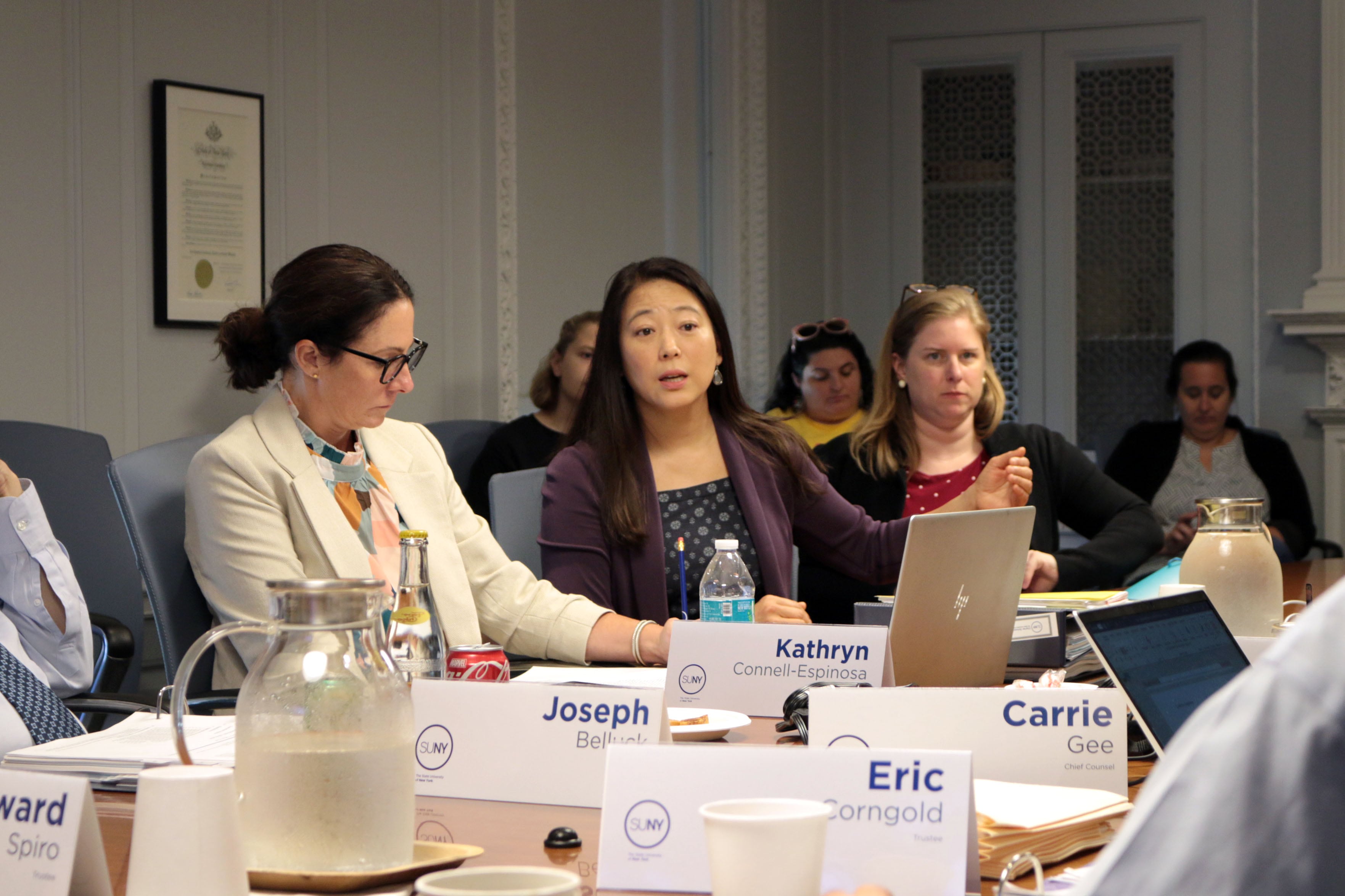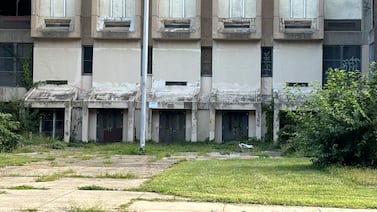Sign up for Chalkbeat New York’s free daily newsletter to keep up with NYC’s public schools.
Ten New York City charter schools got the green light to open their doors on Wednesday, a surprise as only nine were thought to be up for grabs.
The latest wave of approvals means the sector has once again reached a state-imposed limit on the number of charter schools, prompting backers of the publicly funded yet privately managed schools to immediately call for the legislature to raise that cap.
Most of the charters granted by the State University of New York Charter Schools Committee on Wednesday will go to established networks known for posting high test scores. That drew frustration from some applicants who sought to pursue new and innovative models, including a middle school geared toward LGBTQ+ youth.
Three Zeta Charter Schools, a small network helmed by a Success Academy alum, were cleared to open in Queens. Success Academy, the city’s largest and most controversial charter network, also won three new schools. But in an unusual arrangement, one of those three will be transferred from an existing network, Explore, which currently has two unused charters.
The city’s charter schools, which educate about 146,000 children or 15% of public school students, are limited by state law that dictates the number of charters that can operate, a threshold reached in 2019. In a deal hashed out last year, lawmakers agreed to allow 14 so-called “zombie” charter schools that had been closed to be reissued to other operators. There are about 280 existing New York City charters.
The SUNY charter committee, one of the agencies empowered to grant charters, awarded five of those 14 slots last fall and was expected to hand out the remaining nine on Wednesday. But the group ultimately approved 10 schools. (Another three Success schools and one Zeta charter were also approved Wednesday and are expected to be first in line if the legislature raises the cap.)
Carrie Gee, chief counsel for SUNY’s Charter Schools Institute, said SUNY could approve an additional school because the Explore charter that will be transferred to Success Academy never opened. The other 14 “zombie” charters had at one point been open and were later closed, surrendered, or not renewed, meaning state officials had to grant permission to reissue them to other operators, Gee said.
SUNY officials said they intend to award the second unused Explore charter to Minisink Charter School, which was previously approved. A third unused charter may become available soon, they added.
The move to transfer existing charters immediately drew pushback from John Liu, head of the state senate’s New York City Education Committee and a frequent charter school critic.
“SUNY has continued to take liberties with the law circumventing the State Education Department and putting public school systems in jeopardy,” Liu wrote in a statement. “We will continue to pursue legislative remedies toward this end.”
For their part, charter school backers immediately called on state officials to obliterate the limits on charter schools. “An artificial cap on great schools makes no sense,” James Merriman, CEO of the New York City Charter School Center, said in a statement.
Gov. Kathy Hochul, who previously pushed for a significant expansion of the sector, said she would “continue working with the Legislature to deliver high quality educational opportunities to New York students,” a spokesperson wrote in an email.
But raising the cap will likely be an uphill battle, as charter schools have fallen out of favor in recent years with Democrats in Albany who control the state legislature. Overall public school enrollment remains far below pre-pandemic levels — and some charter networks have also struggled with enrollment — prompting concern about opening new campuses as schools must compete for students and the dollars that follow them.
Smaller operators raise concerns about approval process
In addition to the Success and Zeta schools, SUNY officials voted to grant charters for four other programs, all of which have existing campuses: Urban Dove Charter School V, a Brooklyn high school geared toward students who are behind and have struggled at traditional high schools; Next Generation Charter School, a K-5 program in the Bronx; South Bronx Classical Charter School V, a K-5 school; and Lamad Averne Academy Charter School, a K-5 program that will open in Queens.
But some of the people who submitted charter proposals expressed disappointment that SUNY seemed to favor larger networks and operators that have more campuses, resources, and political capital.
The architects of a proposal to open Miss Major Middle — a school serving fifth through ninth graders geared toward LGBTQ+ students — said they were surprised to learn their school wasn’t up for a vote on Wednesday. They said the school would fill an urgent need, as those children often face hostility at school and may suffer from mental health challenges.
“We were told by SUNY we had an excellent application,” said Jill Glassbrook, who would have been the school’s co-founder and executive director. “Why are we not on this list?”
Glassbrook and her co-founder Joji Florence said SUNY officials informally shared some concerns about meeting their enrollment targets for ninth grade, their plans to support struggling students, and their proposal for Florence to be a part-time executive director of the school.
But the duo said they were not given an opportunity to amend their application to address those issues, nor were they given a detailed sense of why SUNY officials did not ultimately move their application forward. Last month, officials encouraged them to withdraw their application, which they declined to do.
“It feels very much like they’re not following through on what the intention of charters in general is … innovate on school models and provide alternatives to families” rather than replicating existing schools, Florence said.
Tim Castanza, who sought to open a middle school geared toward students with language-based disabilities modeled on his existing elementary school, also said he was encouraged to withdraw despite receiving encouraging feedback from SUNY officials.
Castanza said he believed SUNY’s main concern was that his existing school did not yet have a lengthy track record. He ultimately withdrew the application.
“We kind of knew this was going to be a little bit of an uphill battle because the competition was real and [we’re] competing against large charter management organizations,” Castanza said. “I just wonder how many more of those schools we need. That’s not going to make me a popular guy in this sector, but that’s the truth.”
Joseph Belluck, who chairs SUNY’s Charter Schools Committee, said the committee has approved independent charter operators in the past. But given the strict limit on new schools, and the challenges of launching a brand-new model, the committee focused on schools with proven track records.
“Part of the concern was making sure that we gave the charters to the people with the strongest likelihood of succeeding,” he said. “The more [charters] we have, the more innovative and risk-taking we can be.”
A SUNY spokesperson added that it is a common practice to encourage applicants to withdraw their applications if they are not given a positive recommendation to move forward for a vote by SUNY Charter Schools Institute staff.
“The Institute’s review of submitted proposals is a progressive, comprehensive, holistic, and multi-step process,” SUNY spokesman Michael Lesczinski wrote in an email. He also emphasized that four of the six organizations granted new charters on Wednesday are “small, independent operators seeking to replicate.”
Only 18% of first-time applicants have historically been approved for a new charter, he added.
Alex Zimmerman is a reporter for Chalkbeat New York, covering NYC public schools. Contact Alex at azimmerman@chalkbeat.org.





